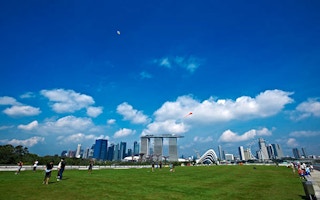The Building and Construction Authority (BCA) of Singapore, through its Centre for Sustainable Buildings (CSB), announced on Tuesday a new partnership with the United Nations Environment Programme (UNEP) to boost the region’s efforts in fighting climate change.
The new project, called “The Nationally Appropriate Mitigation Action (NAMA) Development for the Building Sector in Asia”, will focus on helping countries in Asia to develop national plans that will lower the amount of greenhouse gas emissions from the building industry.
The Centre for Sustainable Buildings is a joint initiative between BCA and UNEP set up in 2011. It will work with UNEP as an implementing partner formulating necessary policies and actions to improve the building sector.
“
This effort will establish a strong regional support network to enable continued development of mitigation actions… BCA will strive to grow the BCA-CSB into a hub for green buildings in the region and contribute to the global efforts of reducing carbon emissions from buildings
Dr John Keung, BCA-CSB chairman
According to Dr Arab Hobollah, UNEP’s chief for sustainable consumption and production, “Buildings are responsible for a third of global greenhouse gas emissions every year. With emerging countries in Asia experiencing strong construction growth in response to rapid urbanisation and economic growth, we foresee a precipitous increase in greenhouse gas emissions.”
“This project aims to help Asian countries mitigate the harmful effects of climate change, cut emissions, and set sustainable development goals,” he added.
The targets to be implemented will be identified through the local context of each country, which is what the NAMA is all about, explained the CSB.
The NAMA concept was established in 2007 when the Bali Action Plan was adopted at the United Nations Climate Change Conference. It requires developing countries to develop climate mitigation actions supported by technology, financing and capacity-building that are appropriate in the country’s unique context, and which are measurable, reportable and verifiable.
In this new partnership, the CSB and UNEP will further develop the former’s current work, which is supporting four priority countries – Indonesia, Thailand, Vietnam, and the Philippines. The two organisations will identify and evaluate the actions of these countries and assist in creating building sector mitigation actions.
This may eventually lead to formal NAMAs, which will provide measurement, reporting and verification (MRV) tools, and establish an overall framework to support the development of these countries. A regional support network will also be on hand for added guidance.
The Centre for Sustainable Buildings and UNEP also plan to use UNEP’s Common Carbon Metric (CCM), a standard for measuring energy consumption and reporting greenhouse gas emissions from buildings.
Other partners joining the project include the UNEP Regional Office for Asia and Pacific in Bangkok, the UNEP-RISOE Centre near Copenhagen, Tsinghua University in Beijing, and The Energy and Resources Institute (TERI) in New Delhi. They will help provide baselines and track the progress of emission reductions per country.
“As Asia continues to embark on the green building movement, this collaboration has proven to be more critical,” said Dr John Keung, BCA-CSB chairman.
“This effort will establish a strong regional support network to enable the continued development of mitigation actions, creating a legacy beyond the project lifespan itself. BCA will strive to grow the BCA CSB into a hub for green buildings in the region and contribute to the global efforts of reducing carbon emissions from buildings,” he added.
The new initiative was announced during Singapore’s annual Green Building Week, which aims to raise awareness on green building solutions and features the International Green Building Conference, which convenes 1,000 thought leaders and sustainability experts to collaborate on green building development.















